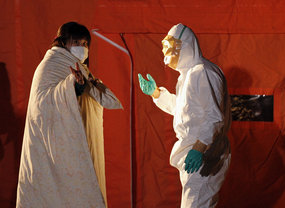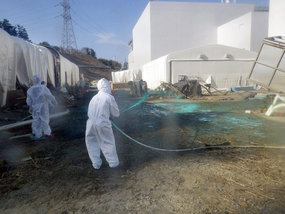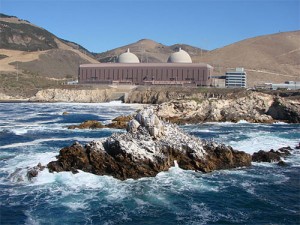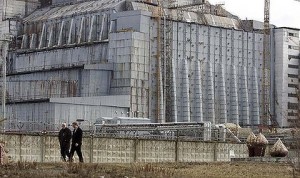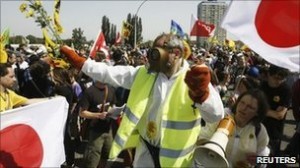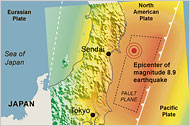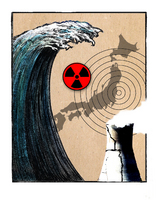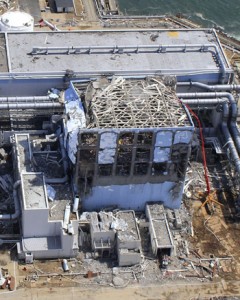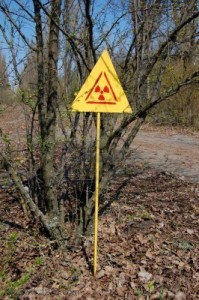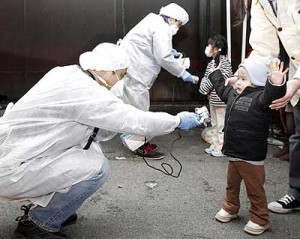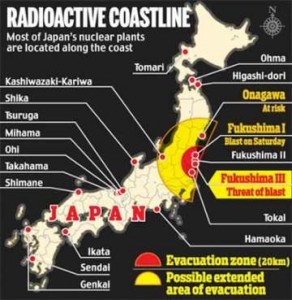ROLLING UPDATE from Beginning of Crisis
SHORT URL: http://tinyurl.com/PBI-Japan-Update
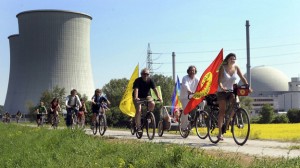
16 May 2011
ALL: Study: Seaports unready for climate change
CANADA: Climate change threatens arctic coastlines
CHINA: China’s Nuclear Arsenal: Status and Evolution
EUROPE-SPAIN: Spanish Quake Jolts European Nuclear Debate
GERMANY-JAPAN-USA: Nuclear Nations Turn To Natural Gas And Renewables
INDIA: Manmohan Singh takes stock of country's nuclear arsenal
INDIA-PAKISTAN: Towards An Indo-Pak Nuclear Lexicon: Minimum Nuclear Deterrence – Analysis
INDONESIA: Strong earthquake strikes off Indonesia’s Java island
JAPAN: Japanese Officials Ignored or Concealed Dangers
JAPAN: Japan Sticks to Timeline for Solving Nuclear Crisis
Plant operator Tokyo Electric Power Co. also acknowledged that one of the factors contributing to a rapid meltdown of reactor cores was the failure to keep emergency batteries safe from the tsunami, preventing a key emergency cooling system from performing its intended function.
Meanwhile, Tepco said one of the key causes of a rapid meltdown at Unit No. 1 was the failure of two emergency cooling mechanisms—the suppression pool and the isolation condenser—to perform their intended functions.
PAKISTAN: Pakistan's nuclear surge exposed
Indian slam, satellite and video, 100% jump by 2021.
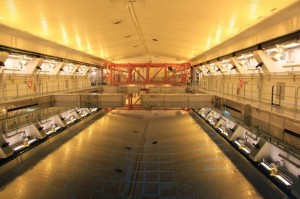
SWEDEN: Sweden's Holding Tank For Nuclear Waste
“We have here about 2,000 tons that you are looking (at), and you can stand here as long as you want to,” she tells me before quickly adding, “If we take one of these bundles out of the water I will give you 20 seconds to leave this room alive.”
USA: US reactor outages 50 pct above late-spring average
USA: U.S. Nuclear Output Falls as Entergy, Progress Shut Reactors
Twenty- five of the nation’s 104 reactors were offline.
USA: 75% of Americans Have Never Heard of Climate-Gate, Study Reveals
Prior Updates, Graphics, and Original Overviews Below the Line
ALL: The Fate of the Nuclear Industry after Fukushima
Fukushima has given the industry the chance to reassess its safety features and the regulatory institutions to be tougher and more proactive. Perhaps, it is time to take a critical look at relatively safe nuclear technologies like the pebble bed modular reactor. The industry must guard against cutting corners for financial again.
ALL: Catholics and climate change
“Failure to mitigate climate change will violate our duty to the vulnerable of the Earth, including those dependent on the water supply of mountain glaciers, and those facing rising sea level and stronger storm surges. Our duty includes the duty to help vulnerable communities adapt to changes that cannot be mitigated. All nations must ensure that their actions are strong enough and prompt enough to address the increasing impacts and growing risk of climate change and to avoid catastrophic irreversible consequences.”
Phi Beta Iota: The Catholic Church, long known for its dogma and repression of dissidents, is clearly “coming out” in a very substantial way on the convergence of science and religion, the mutual focus on truth, and the totality of the challenges facing all of us. It is for this reason that we continue to emphasize the opportunity inherent in the Assisi Peace Summit, if it can be create both an inter-faith appreciation for the need to embrace strategic analytics, and an inter-faith emphasis on secular corruption as the primary cause of inter-faith stress.
Report by the Working Group Commissioned by the Pontifical Academy of Sciences
INDONESIA: Improve energy management before going nuclear: Experts
JAPAN: Japan evacuates villages outside nuclear zone
JAPAN: Cores Damaged at Three Reactors
PAKISTAN: Is US inching towards Pak nuclear assets?
PAKISTAN-USA: Obama to deploy US troops in Pakistan if nuclear installations under terror threat
SYRIA: U.S. Presses Nuclear Case Against Damascus
UK: MPs attack government's covert subsidies for nuclear industry
“…the ‘greatest single obstacle’ to building a repository is an erosion of public confidence in the federal government.”
ALL: UN climate change panel refuses to correct ‘mistakes' in Cancun pact
ANTARCTIC: Unzipping climate change
CANADA: As treeline shifts north, wildlife will change
JAPAN: Worker dies at Japan's crippled nuclear plant
KOREA NORTH-IRAN: North Korea, Iran trade missile technology: U.N.
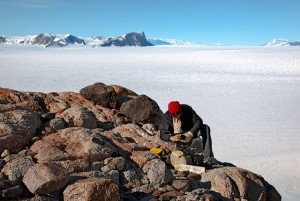
UK: Historic climate change deal with legal powers agreed by Cabinet
USA: Poor suffer as Mississippi levels rise
USA: Climate change to create a dustier Southwest
USA: NRC waives fire rule violations at nuclear plants
The Nuclear Regulatory Commission is routinely waiving fire rule violations at nearly half of the nation’s 104 commercial reactors, even though fire presents one of the chief hazards at nuclear plants.
VIET NAM: Climate change plan is vital for Viet Nam

13 May 2011
ALL: Climate change bringing infection, hunger, illness
Phi Beta Iota: Everything is connected. This article exaggerates the role of climate change while ignoring the role of corruption and uninformed decision-making that fails to evaluate threats, policies, and spending in a holistic manner.
ALL: International Climate Panel Announces Reforms on Conflicts, Errors
Phi Beta Iota: The IPCC (elements thereof) has been guilty of fraud at multiple levels. While reforms are a welcome advance, the United Nations remains a “dumb” organization that is unable to design holistic information collection, processing, and analysis architectures. The Arctic nations have an opportunity to test such a holistic approach and then migrate it back to the UN and to regional organizations.
ALL: Startup EarthRisk bets on bad weather
Phi Beta Iota: Earth Science has done well as information sharing and sense-making on a planetary level, but has not integrated holistic analytic models or global gaming architectures to connect history, the present, and predictable futures (this includes future true costs of really terrible Earth-degrading decision today). Climate Change is an opportunity–the UN is thinking about Earth Dashboard but cannot conceptualize the hybrid grid needed to get there. The Arctic nations are perfectly positioned to move this forward.
CHINA-PAKISTAN: Sweet as can be?
CHINA-PAKISTAN: Southern Asia's nuclear myths revisited post bin Laden
In May 1990, the Pakistan army embarked upon a high-stakes gamble against India that utilised its covert nuclear weapon capability as a firewall to step up terrorism and low intensity conflict in the Kashmir valley. In retrospect, it may be averred that this was the period when the Pak Army introduced the concept of NWET — or nuclear weapon enabled terror — which was far removed from the pristine concept of the ‘core' mission of the nuclear weapon that was predicated on the rectitude of the ‘responsible' state that had deified nuclear deterrence as the one and only mission of the abominable nuke.
CHINA-IRAN: Iran's Big Brother In The East
Washington doesn't seem eager to dwell on the issue of Chinese support for Iran's nuclear program – at least in public.
CHINA-TAIWAN: China wants talks on nuclear safety
EUROPE: Compromise found in EU nuclear safety testing row
IRAN: LAICIE OLSON: The game is changing in Iran
Inside Iran, the situation is tense. Food prices have risen almost 25 percent over the past year, twice the overall inflation rate, and in a rare statement of concern, Iran’s oil minister recently noted that the country’s ability to export oil will be at risk without new investment.
JAPAN: Radiation found in seaweed near crippled Japan plant
JAPAN: Giant Polyester Sheets To Cover Nuclear Reactor Buildings
USA: La. spillway to open, flooding Cajun country
About 25,000 people and 11,000 structures could be in harm's way when the gates on the Morganza spillway are unlocked for the first time in 38 years. Opening the spillway will release a torrent that could submerge about 3,000 square miles under as much as 25 feet of water but take the pressure off the downstream levees protecting New Orleans.
A rapid increase in the price of natural gas and federal law stamping a price on the carbon dioxide emitted by fossil fuel burning plants are two developments that could make the nuclear project viable, an NRG spokesman said.
USA: Nuke plant may face 2nd violation
USA: Problems cited with nuclear backup power
USA: U.S. panel proposes network of nuclear waste sites
USA: Nuclear Expert Warns Congress U.S. Power Plants Not Safe
12 May 2011
ALL: UN body suggests mechanism to adapt to climate change
GENEVA: The World Meteorological Organization (WMO) — the United Nations' authoritative voice on weather, climate and water — has recommended setting up of a Global System for Climate Services which will help countries understand and adapt to climate change and reduce the risk of natural disasters, saving lives and livelihoods. WMO is billed as one of the most important initiatives, and only next to the Kyoto Protocol and Inter-governmental Panel on Climate Change.
Phi Beta Iota: This is both very important, and very ignorant. The UN is a complete mess of stove-piped organizations that are not responsive to the Secretary General, are badly informed and unable to create intelligence (decision-support), and never, ever do serious multinational information-sharing and sense-making. The International Panel on Climate Change (IPCC) is a good example of both the best and the worst of the UN. What the UN and all stakeholders require is a global decision support network such as is described–including regional information-sharing and sense-making networks, in INTELLIGENCE for EARTH: Clarity, Diversity, Integrity, & Sustainability (EIN, 2010). A short version of this coherent and immediately implemenable vision is at 2010 The Ultimate Hack Re-Inventing Intelligence to Re-Engineer Earth (Chapter for Counter-Terrorism Book Out of Denmark) with useful context also at Seven Answers–Robert Steele in Rome.
EUROPE: EU nuclear safety testing row in meltdown
Phi Beta Iota: When dealing with potentially catastrophic and irreversible threats, it is appropriate to demand “worst case” true cost calculation. This applies to biological, chemical, and radiological as well as electromagnetic.
INDIA: India Seeks Uranium Mines Overseas
IRAN: Russian says Iran atomic plant to operate in weeks
IRAN: Iran operating ‘worldwide smuggling network'
JAPAN: Officials Find Damage Is Worse at Japanese Reactor
JAPAN: Fukushima reactor has a hole, leading to leakage
JAPAN: Japan’s nuclear crisis shows up the ‘unknown unknowns’
But two things stand out from the latest accident at the Fukushima Dai-ichi plant: the unpredictability of incidents and their scale; and faith in technology is not the same as faith in regulation and oversight over compliance.
USA: Fed asks Oconee Nuclear for plans on handling ‘extreme events'
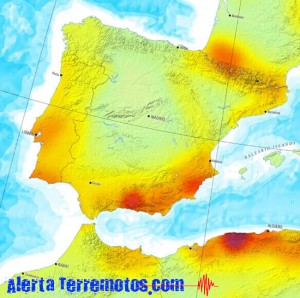
11 May 2011
ANALYTICS FOR ALL: True cost of nuclear examined in new study
Phi Beta Iota: This is in our view a vital break-through in public policy intelligence and integrity. This is the heart of the matter, and this kind of honest robust thinking should be part of every discussion about nuclear power, alternative energy, and climate change, including the “true cost” of High Frequency Active Auroral Research Program (HAARP) and related Russian and Chinese initiatives.
ANALYTICS FOR ALL: Green schemes are ‘wide open to major corruption'
Millions of pounds in grants and aid are being siphoned off by fraudsters, warns report
ANALYTICS FOR ALL: The Case for Human Ingenuity: The Absolute Return Letter – May 2011
Phi Beta Iota: This is a clever review. We have said in the past that the human brain is the one inexhaustible resource on the planet, but only recently have we begun to see the World Brain and Global Game as the means for achieving non-zero (win-win) evolution, a prosperous world at peace that works for all.
DENMARK-KOREAS: Green growth office opens in Denmark
Denmark to Tighten Border Controls
Phi Beta Iota: These two items happened to be next to each other, but the second merits comment. Any country that does not have a population policy and plan for its demographics into the future is no longer a country, it is just a transit zone. Everything is connected–strategic analytics on HAARP, for example.
GERMANY: Ethics Commission Recommends Swift German Nuclear Phaseout
INDIA: Jairam: I admit our nuclear energy programme must be transparent
Phi Beta Iota: Transparency and true cost–truth–create trust and lead to non-zero (win-win) outcomes for all stakeholders.
IRAN: Iran gets nuclear fuel from Russia for power plant
ISRAEL: Freeing Israel from its Iran bluff
ITALY: Many people flee Rome amid earthquake fears
JAPAN: Underwater robot captures Japan's Fukushima nuclear plant wreckage damaged by tsunami
JAPAN: Japan Backs Off Of Nuclear Power After Public Outcry
SPAIN: 2 Quakes Strike Spain, Deaths Feared
USA: Nuclear Problems in the Rearview Mirror
USA: Politics behind nuke waste issue, GAO says
Independent agency says Yucca decision not based on science
USA: The Future of U.S. Nuclear Power
USA: High Waters: A Climate Connection to the Mississippi River Floods?
10 May 2011
EXXON: 9 out of 10 top climate change deniers linked with Exxon Mobil
IRAN: Iran agrees to resume nuclear negotiations
JAPAN: Nuclear collapse looms? Fukushima No. 4 reactor ‘leaning'
USA: North Ala. nuclear plant cited for safety by NRC
USA: Vt. flooding raises Champlain pollution concerns
USA: Mississippi Flooding Threatens Crops, Refineries and Homes
USA: Flooding of Southern Farms Poised to Wreak Havoc on Economy
USA: “Once in a lifetime” flood submerges farm land
Phi Beta Iota: This is the SECOND time in the past fifteen years this level of flooding has occurred. The first was in 1993 and was so extensive satellite imagery was required to grasp its magnitude. At the time all railroad bridges across the Mississippi were out of service. The Great Flood of 1993 inundated more than 20 million acres in nine states. Hundreds of levees failed along the Mississippi and Missouri. For the media to not remember this is quite astonishing.
USA: Indian Point Nuclear Evacuation Plan ‘Impossible’ Lawmakers Say
USA: VIDEO: Colorado kids file climate change lawsuit, plan Saturday march
Phi Beta Iota: The children are filing a lawsuit against climate change programs. This is consistent with the growing movement among Libertarians against “Agenda 21” and Sustainable Environment initiatives.
VATICAN: Vatican-appointed panel warns of climate change
WORLD: How 29 Long-Ignored Elements Could Make or Break the Clean-Energy Revolution
WORLD: Bill Gates On Clean Energy: Why China Won’t Lead The Way
“If the world was to swap oil for Li-Ion based battery propulsion,” he wrote, “South America would become the new Middle East. Bolivia would become far more of a focus of world attention than Saudi Arabia ever was. The USA would again become dependent on external sources of supply of a critical strategic mineral while China–home to significant lithium deposits–“would have a certain degree of self sufficiency.”

9 May 2011
EARTH: Vatican working group calls for concrete steps to combat climate change
Phi Beta Iota: The Assisi Peace Summit in October 2011 would be an excellent opportunity to discuss the convergence of faith and science, and the need for strategic analytics and a holistic “all in” approach to poverty and the other nine high level threats to humanity. Absent a single government taking up this idea for direct discussion with multiple faiths in advance of Assisi, it will not happen.
EARTH: Fighting Record Floods Means Tackling Climate Change Too
EARTH: Thor's [Thorium's] nuclear-powered hammer
Some physicists and tech-watchers believe thorium holds key to nuclear renaissance
EARTH: Fukushima boosts green case for nuclear (Financial Times)
Phi Beta Iota: This is a remarkably uninformed polemical piece lacking strategic analytic integrity.
KOREAS: Pres. Lee Willing to Invite N. Korean Leader to Nuclear Security Summit
MONGOLIA: U.S., Japan Deny Plans to Send Spent Nuclear Fuel to Mongolia
PAKISTAN: Why the U.S. must not allow the nuclear state Pakistan to implode
RUSSIA: Russia flexes nuclear muscle on Victory Day
USA Republicans want nuke [weapon] modernization pledge kept
USA: Nuclear Regulatory Commission Changed Nuclear Relicensing Rules
USA: Safety Reviewers Raise Questions About Construction of New Nuclear Fuel Plant
More than a decade later, the mixed oxide fuel (MOX) plant is running into mounting troubles, including long delays, soaring costs and the lack of utilities committed to use the new fuel in their reactors.
USA Mississippi River Gets Radioactive Water Dumped into It from Nuclear Plant
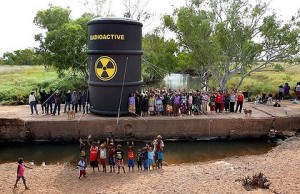
8 May 2011
AUSTRALIA: Ownership of nuclear waste site disputed
CHINA: In China the Big Nuclear Question Is ‘How Soon?'
CHINA-TAIWAN: Nuclear power plants reviewed
EUROPE: Nuclear Power vs. Renewable Energy Development
Phi Beta Iota: “True Cost” transparency could do a great deal to accelerate public appreciation for the long-term return on investment in renewable energy–when subsidies to nuclear are 40 times greater, *and* there is a hidden cost of government assumption of liability for nuclear accidents, the way is open for a “clean start” in the public debate over energy.
GULF CC: GCC to embark on N-plans
INDIA: IIT-B to start masters course in nuclear engineering this yr
INDONESIA: president wary over nuclear power
JAPAN: Idyllic village on way to becoming nuclear ghost town
JAPAN: In search of a nuclear disposal site
KOREA N: Lee says North's nuclear weapons an obstacle to unification
KOREA S: S. Korea Raises Tsunami Walls to Quell Unease About Atomic Risks
UK: Nuclear ‘cheapest low-carbon option' for UK energy
Phi Beta Iota: Classic example of a very poor analytic model that does not calculate true cost.
UK: Committee on Climate Change calls for renewable energy revolution
WORLD: Rise in climate change disasters
…low-level frequent climatic disasters including floods and droughts hit children hard. The report looked at eight countries which regularly experience such events, and found a link between an increase in disasters and diarrhoea, low birth weight and malnutrition. In most of the countries children's education suffered because of disaster damage and illness.
7 May 2011
Don't believe the nuclear hype: business as usual is the real catastrophe
As scary as the current Japanese nuclear disaster is with radiation displacing thousands of people and poisoning the ocean around the plant, the environmental damage caused silently by the business-as-usual use of coal, natural gas, oil, and hydroelectric power is arguably greater than the current nuclear crisis. The mainstream media doesn't send out camera crews to film coal-fired power plants operating as designed, or natural gas fracking wells, or mountaintop removal mining, but that doesn't mean that each isn't an ongoing ecological catastrophe.
Phi Beta Iota: The correct answer is never “either/or” but always “some of each.” Nuclear is a catastrophic threat, but so are all the others, just more slowly. All ten high-level threats–beginning with poverty which does more environmental and disease damage than all corporations put together–must be addressed by harmonizing all twelve core policies and especially those on education, energy, family, health, and water.
More lax safety management exposed at Japan nuclear plant
Japan: Post tsunami Japan recalls post war period
The country faces the consequences of the earthquake and tsunami. At least 25 thousand dead or missing; 126 thousand homeless and jobless people living in temporary shelters without a decent standard of living, as guaranteed by the Constitution. Need to rethink the nuclear energy policy.
Dagan: Israeli airstrike on Iran nuclear plant ‘foolish'
Climate change has spurred food prices: study
Phi Beta Iota: This is very misleading, especially in the USA. Competition for corn as fuel instead of food, combined with a wide variety of policies on everything from oil to water to the industrialization of agriculture and the centralization of control over food are part of the total analytic challenge.
Volunteers fill sandbags in Vermont to hold back Lake Champlain
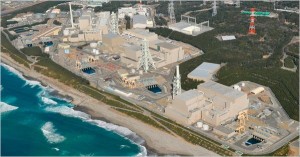
6 May 2011
Japan Orders Nuclear Plant to Suspend Operations
Fault found in nuclear plant in central Japan
Study finds no leukaemia link to UK nuclear plants
Phi Beta Iota: Electromagnetic pollution, as with bio-chemical pollution, is multi-causal and multi-effective. It needs to be studied as a whole.
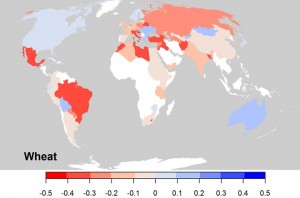
Phi Beta Iota: “True cost” and “full cost over life cycle INCLUDING WASTE” are both absent from most calculations.
Climate Change Wilts Farming Yields
South Korea to Invest 1 Trillion Won (US$922M) Checking Nuclear Plants
Invoke Sun, Wind gods for satisfying energy needs
Rich nations miss U.N. climate finance deadline
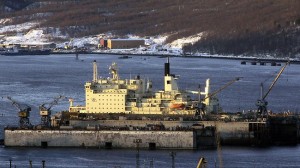
5 May 2011
Nuclear leak forces Russian icebreaker back to port
JAPAN: Workers enter No. 1 reactor building for first time since explosion
Iran Won't Attack Israel With Nukes, Barak Says
Factbox: Pakistan's nuclear capability
Scrapping Yucca Mountain exposes U.S. to fines
Environment, tea party protests target Duke Energy
Bill Gates, Jeff Bezos back nuclear power
Climate Change Hinders Crop Yields, Study Finds
UN Climate change panel concludes renewable energy will be key tackling global warming
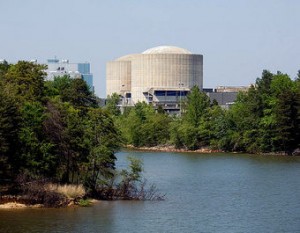
Climate Change to Increase Deadly Heatwaves
Heat Waves Putting Pressure on Nuclear Power's Outmoded Cooling Technologies
Power generated from coal, natural gas and nuclear withdraws more freshwater per year than the entire agricultural sector; nuclear uses the most
Phi Beta Iota: It is not possible to do responsible nuclear-climate change analytics in the absence of a strategic analytic model that takes into account the “true cost” of all options. Potable water is the third leg of the challenge.
Holistic Analytics for Nuclear-Climate
Grains Wilt in Dry Europe as England Posts Its Hottest April in 352 Years
Climate Change's Impact On U.S. Wind Energy
Effects of Climate Change in Arctic More Extensive Than Expected, Report Finds
American Security Project: How Much Will Climate Change Cost Your State?
New Population Projections Show Us Growing Unsustainably, But We Can Put on the Brakes
3 May 2011
Japanese nuclear plant a time bomb?
Severe weather knocks out TVA nuclear plant
TVA Updates Status of System After Devastating Storms
Sharp rise in European anxiety on nuclear safety
5 Arrested in UK on Suspicion of Terrorism at Nuke Plant
Germany Hopes To Be Nuclear-Free Before 2022
France's Sarkozy denounces nuclear phase-out calls as ‘medieval'
Bill Gates Puts His Money and Mouth Behind Nuclear Power
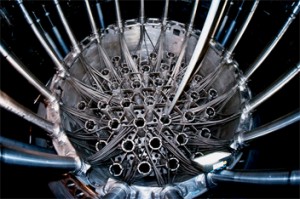
2 May 2011
Will Cost Kill Future Nuclear?
Why A Top Coal Company Just Made A Gigantic Bet On The Energy Of The Future [Coal]
Osama bin Laden, Oil and Climate Change
Radioactive cars from Japan arrive in Chilean port
Expert Warns on Climate Change
Nuclear’s Health Risks on Chernobyl Anniversary
Deadly weather in US could become the norm
Drumbeat of Nuclear Fallout Fear Doesn’t Resound With Experts
In the world’s oceans, thousands of decomposing drums of radioactive waste pose bigger dangers than the relatively small amounts of radioactive water released from the Fukushima Daiichi plant. And natural radiation from rocks, cosmic rays and other aspects of the environment, experts say, represents the biggest factor of all — far bigger than all the man-made emissions, including the current increase from the crippled Japanese reactors.
German nuclear review throws up new problems
Severe weather in US Southeast impacts coking coal production
Nuclear waste storage a top issue for NRC-chairman
US Identifying Nuclear Policies To Review After Japanese Crisis
Flooding, blackout recovery, waste transfer and long-term storage….
GDF Suez CEO Sees Nuclear Costs Rising, Renewable Energy Not Filling Gap
Surprising Forecast of China's Energy Future
1 May 2011
Japan’s prime minister blasted over crisis management
AP IMPACT: Ties bind Japan nuke sector, regulators
An Associated Press review of Japan's approach to nuclear plant safety shows how closely intertwined relationships between government regulators and industry have allowed a culture of complacency to prevail.
Regulators simply didn't see it as their role to pick apart the utility's raw data and computer modeling to judge for themselves whether the plant was sufficiently protected from tsunami. The policy amounted to this: Trust plant operator TEPCO — and don't worry about verifying its math or its logic.
This kind of willful ignorance was not unique within a sympathetic bureaucracy at the Ministry of Economy, Trade and Industry.
Berlin meeting focuses on nuclear safety
UAE urges stern steps on N-arms
Behaviors of birds, bees, ants, fish hint at climate change
New report says climate change likely to make water
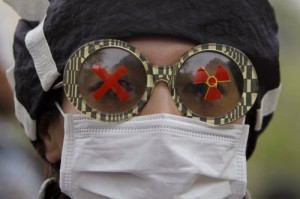
Nuclear renaissance is over, says climate minister
Nuclear dilemma: Adequate insurance too expensive
Phi Beta Iota: This one headline explains the irresponsibility of all governments. The insurance companies understand risk and return. What we have in the case of those nuclear plants in high risk (earthquake, tsunami, flood plains) areas is a refusal by government to be responsible….nuclear nepotism. Nuclear power is a very important option–provided that intelligence and integrity are integrated into its employment.
Government Adviser Quits Post to Protest Japan's Policy on Radiation Exposure for Fukushima Schools
NRC casts doubt on US reactors’ blackout plans
Daily brief: Pakistan tests nuclear capable missile
Nuclear Weapons Contrary to Islam, Says Iranian Official
A Third of Large U.S. Firms Show Business Interruption From Japan Disaster
Nuclear Energy Institute Report on Japan's Nuclear Reactors, April 29, 2011 (4 PM EDT)
Wasteful monuments of nuclear age
Nuclear Incest: Did industry-government collusion contribute to Japan's nuclear disaster?
Fumihiko Yoshida: Nuclear plants must not turn into radiological weapons
Chernobyl nuke cleanup to be costly for decades
KIEV, Ukraine (AP) – A week of meetings on the world's worst nuclear accident has highlighted a key message: the Chernobyl cleanup will remain expensive and anxiety-provoking for decades to come.
Underpowered and unsafe, Pakistan's nuclear reactors are just big boys' toys
A Cost of Denying Climate Change: Accelerating Climate Disruptions, Death, and Destruction
Does Wild Tornado Season Signal Climate Change?
CEO: Allstate Running Business as if Severe Weather Is Permanent Change
India green panel recommends deferment of nuclear plant plans
IAEA makes it official: Israel hit Syrian nuclear reactor in ‘07
USA: Nuclear chief questions emergency power at plants
DPRK leader says willing to negotiate with S. Korea, six-party members: Carter
Advancing the Debate Over Nuclear Waste Storage Locations
Photographer documents emptiness, silence of Japan nuclear crisis
Russia Proposes Stricter Rules for Nuclear Safety
Putin wants to export ‘world best' Russian nuclear safety
Storms knock out TVA nuclear units, power lines
Poll: Majority believe nuclear crisis is likely in US
Computer Worm Wreaking Havoc on Iran's Nuclear Capabilities
Fears rise in India of Fukushima-style nuclear disaster
Possible, India resumes nuclear test?
Its decision to field tactical nuclear weapons will only make the subcontinent more unstable.
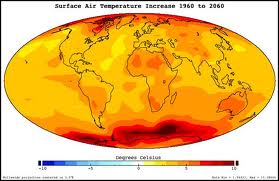
26 April 2011
Could a Rogue Computer Virus be Used to Shut Down Nuclear Plants Worldwide?
Culture of Complicity Tied to Stricken Nuclear Plant
Nuclear power: The fear is terrorism, not earthquakes
Preventing the Nuclear Apocalypse
The Road From Fukushima to Nuclear Abolition
Climate change could hit Western US water supply
The Big Thirst: Why Climate Change Might Cut Your Shower Short
The Nuclear Disaster That Could Destroy Japan … and the World
Japan’s Terrifying Day Saw Unprecedented Exposed Fuel Rods
TEPCO Reveals [Fukushima] Radiation Map
Chernobyl recovery officer criticises Japan's efforts at Fukushima
Iran says it was targeted with second worm, ‘Stars'
Anti-nuclear protests in Germany and France
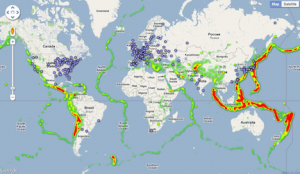
23 April 2011
90 million live within 30 km of a nuclear reactor
South Asia's misplaced confidence in nuclear technology
Tsunami escape steps promoted while Asian nuclear reactors reported at risk for Tsunami
For Russia, Ukraine and Belarus the future is nuclear
22 April 2011
Tens of millions live in nuclear ‘danger zone'
PARIS – SOME 90 million people worldwide live within 30km of a nuclear reactor, equivalent to the exclusion zone around Japan's crippled Fukushima plant, a study released on Friday shows.
Japan braces for quake, typhoon risks amid ongoing nuclear crisis
Warnings of nuclear disaster not heeded, claims former governor
USA: Georgia nuclear reactor idled unexpectedly still shut down
USA: Salem 1 nuclear reactor shut down because of problems with river ‘grassing'
China likely to approve new nuclear power projects
Chernobyl nuke cleanup to be costly for decades
21 April 2011
Magnitude 6.1 quake hits Japan near Tokyo
INDIA: Nuclear power must be expanded: Plan panel
Nuke protester murdered in India as police open fire on peaceful crowd
Guardian Focus podcast: The nuclear debate after Fukushima and Chernobyl
Phi Beta Iota: This would be a good time to revisit both of Charles Perrow's books, The Next Catastrophe–Reducing Our Vulnerabilities to Natural, Industrial, and Terrorist Disasters (2007) and Normal Accidents–Living with High-Risk Technologies (1999). Throw in Blue Death, High-Tech Trash, and Pandora's Poison, and maybe–possibly–some holistic intelligence will emerge….
South Korean Protesters Stage Anti-Nuclear Rally
Wind Power Beats Nuclear Power in Texas
Demonstrators protest Ameren Missouri's nuclear plans
Alabama counties want safer nuclear evacuation route from Browns Ferry Plant
Italy Referendum On Nuclear Comeback Is Now Futile – Minister
France's EDF aims to learn lessons from Fukushima nuclear disaster
Climate Change: Doing Nothing Will Cost More Than Preventative Measures, New Report Shows

20 April 2011
NEW: There is now a realization in mainstream media that the long-anticipated Rim of Fire earthquakes and tsunamis predicted for the period 1998-2012 could not only produce long-term flooding–permanent inundation–of specific coastal areas and the coastal nuclear facilites that would inevitably implode when without power and fully submerged.
Japanese bans entry within 20 km of leaking Fukushima nuclear plant
Solar-Panel Makers Gain as Fukushima Spurs Japan's Anti-Nuclear Movement
Call for renewed debate on nuclear energy in Australia
USA: Senator calls for new step in nuclear relicensing
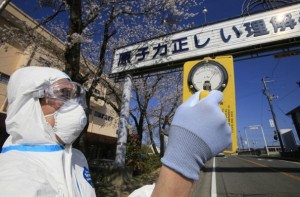
19 April 2011
Early disorder added to Japan’s nuclear crisis
FOCUS: Japan's nuclear emergency medical response team learns bitter lesson
Italy shelves nuclear plans after Japan quake
Russian nuclear chief says plants to grow costlier
Floating Reactors Prompt Proliferation, Terrorism Fears
Russian efforts to make electricity available to isolated areas with a planned class of floating nuclear reactors could represent the most potentially disastrous idea to sweep the atomic power industry in years
Chile's Response to Japan's Nuclear Crisis
Phi Beta Iota: Chile's decision is suspect. It's leaders are not stupid–they know that of all countries, Chile is the best positioned to achieve infinite free energy from its unique combination of thermals and other renewables. Our conclusion is that Chile has decided it must achieve nuclear parity with Brazil and its actual intent is to weaponize its nuclear knowledge. Chile has a legitimate confidence in its ability to engineer earthquake proof and tsunami proof nuclear development facilities, but at what cost?
Past Headlines and Photos Plus Reflections and Links from Tom Atlee
16 April 2011
Poll: Japan nuclear disaster worries Americans
Japan nuclear commission fails to send experts to Fukushima
Nuclear Cleanup Plans Hinge on Unknowns
Nuclear crisis could last 2 to 3 more months, expert says
Nuclear power: Recalculating the facts
15 April 2011
The workers at the bottom of the socioeconomic food chain–including those allegedly hired by the day from skid rows–receive the least safety education and the highest radiation doses.
According to data from Japan’s Nuclear Safety Commission, of the 71,376 Japanese who are employed in the nuclear power industry, 63,420, or almost 89%, work for subcontractors. It is these employees who receive more than 90% of all radiation exposure.
Russia to send mission to assess Sea of Japan nuclear contamination
Nuclear Power's Little Problems
Germany reaffirms nuclear retreat
Quake-Prone Taiwan Halts Nuclear Expansion as Japan Struggles at Fukushima
14 April 2011
Radiation levels jump in groundwater at Japan nuclear plant
Video: 400,000 to develo canceer in 200 km radius of Fukushima
Radiation also fries the microchips in electronic instruments–and Russian Television (RT) is kicking BBC's ass for truthful, timely unconventional insights. Early misinformation by government has ruined lives of hundreds of thousands who believed the false assurances.
Nuclear Cleanup Plans Hinge on Unknowns
TOKYO — Even before the troubled Fukushima nuclear plant has been brought under control, two rival conglomerates likely to be part of an eventual cleanup are estimating that the effort could take 10 years — or 30.
Japan's “nuclear refugees” face the unknown
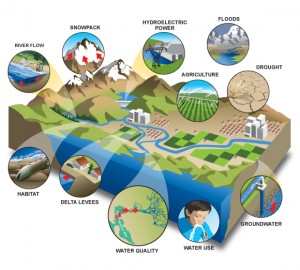
12 April 2011
The power to change the future
Nuclear future will combat climate change: Indian PM
Nuclear Catastrophe in Japan “Not Equal to Chernobyl, But Way Worse”
IAEA says Japan nuclear crisis “totally different” from Chernobyl accident
Japan Atomic Crisis Reaches Chernobyl Level as Radiation Climbs
Japan nuclear accident health risk still small-WHO
(US) Congress turns a blind eye to climate science

11 April 2011
PHOTOS: Chernobyl Birth Defects (2009)
Japan Weighs Giving Nuclear Crisis Chernobyl-Level Rating
Japan Enlarges Nuclear Evacuation Zone as Another Earthquake Hits
Rethinking Japan's energy future
New Photos of Tsunami Hitting Plant
Storage of used nuclear fuel rods at TVA plants, elsewhere stir concern
Iran to build ‘4 to 5' nuclear research reactors
Chernobyl visitors confront the unseen and silent 25 years after world’s worst nuke disaster
10 April 2011
Dangerous Crossroads: Is America Considering the Use of Nuclear Weapons against Libya?
Green activists call for referendum on nuclear power
Kaiga: KGS officials downplay fire in control room
Japan fails to stop radioactive discharge into ocean
PCC condemns Japan's action in Pacific Ocean
In Japan, new attention for longtime anti-nuclear activist
Higuchi said he wanted to show that the latest nuclear technology still relies on pre-modern labor force: “the sweat and the sacrifice of human beings.”
Nuclear Energy Institute Report on Japan's Nuclear Reactors, April 10, 2011 (11:30 A.M. EDT)
Japan nuke disaster to change EU energy mix
In Tennessee, Heat Waves Diminish Nuclear Power Output
NUCLEAR ENERGY: Alternative Laureates Want Nuclear Plants and Weapons Abolished
Below the Line Past Updates and Core References at End
Phi Beta Iota: The lack of data so long after the event is an excellent example of multiple pathologies within the Japanese government, within the US government, among the various governments, and among the eight tribes of intelligence across all boundaries. It is inexcusable to not have, at this time, a fully-formed Multinational Decision Support Center (MDSC) as well as an MDSC Task Force at Atsugi whose job is to collect, process, analyze, and disseminate to the global public the current and projected risks and costs of this global disaster that turned into a catastrophe because of the lack of integrity across multiple boundaries in the past. The US Intelligence Community is beyond broken, it is a major pathology whose continued mis-management makes the White House and the Cabinet more inept and impotent. We need a new Director of National Intelligence (DNI) and we need a completely new culture and mind-set from the top, with someone of unimpeachable integrity and a fire in their belly that no amount of systemic corruption can defeat.
Lack of Data Heightens Japan’s Nuclear Crisis
On Quake History and Climate Warnings
It seems that the more “advanced” a society becomes, the shorter its memory.
Don't plant rice, Japanese farmers told
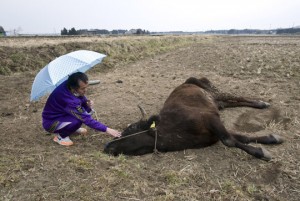
Thailand bans food from near Japan nuclear plant
China expands ban on Japan food
Japan's nuclear radioactivity reaches Pakistan
Fishermen: Utility's actions in Japan nuclear crisis ‘unforgivable'
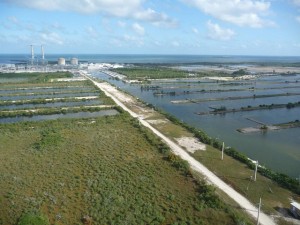 City seethes in radiation zone
City seethes in radiation zone
‘What really threatens our future?’
Fox News Poll: 83% Think Nuclear Crisis Like Japan Could Happen in U.S.
dd
Nuclear energy risk undervalued
Loophole in energy bill could see UK taxpayers funding nuclear bailouts
France to Assess Nuclear Risk and Safety Measures
Utilities: Germany now imports energy after taking nuclear power plants off the grid
NRC orders seismic safety review of all 104 reactors in U.S.
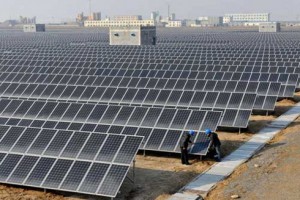 China Doubles Solar Capacity to Cut Nuclear Risk, Pollution
China Doubles Solar Capacity to Cut Nuclear Risk, Pollution
Showdown looms on nuclear risk-sharing
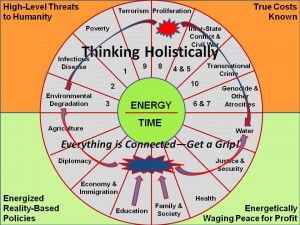
Phi Beta Iota: What is most interesting is the mix of realization that total risk assessment was ignored in the rush to fund nuclear; that taxpayers were committed without being told that the governments had failed to do total risk assessement while also committing the taxpayer to government guarantees, indemnification of the private nuclear developers, and future taxpayer-funded bail-outs; and that the key to the future of nuclear energy lies in a combination of total (long-term) risk and cost analysis and a full taxpayer understanding of how governments have been misrepresenting known risk and future cost while making “guarantees” that are not justified by the analytics. Now seismic tests are being done across all nuclear reactors–that is not the real threat. The real threat at this time is an airplane loaded with explosives driven into an active nuclear reactor by a suicidal terrorist or anti-nuclear activist–combine that with a little radiological waste here and there, plus some explosive charges against the obvious chlorine tanks still accessible to the public and presto–the Industrial Era implodes. We also note the persistent
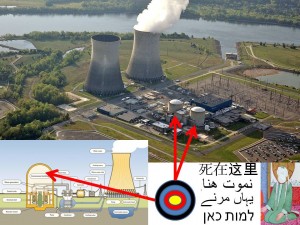
Industrial-Era focus on centralized renewable energy approaches–this is wrong. Renewable energy works best as a distributed neighborhood collection and sharing resource with batteries and cars recharged by renewable energy, not by electricity generated from nuclear, coal, or dams. The key point here is that we are not in an either-or world; we cannot think about nuclear or even nuclear-climate change in isolation from everything else, to include the fundamental redesign of human society in relation to nature.
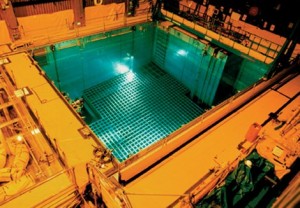
3 April 2011
Phi Beta Iota: The Japanese nuclear-climate catastrophe is producing some very valuable reflection, but does not appear to be the decisive awakening event we anticipated. It would seem that a more in-depth multinational endeavor to study and then disseminate the relevant knowledge is required. The revelation that water is both a threat and a constraint on nuclear opens the way to applying the Strategic Analytic Model to nuclear climate, we have created a new graphic to represent this possibility. Of greatest immediate value is the focus on the dense nuclear waste and the recommendations that no further nuclear construction be undertaken absent a sustainable safe solution to nuclear waste as a permanent threat to humanity.
Japan’s Radiation Scare: The Good News and the Bad

Snapshot: Japan's nuclear crisis
– Estimated cost of damage to top $300 billion, making it the world's costliest natural disaster. The 1995 Kobe quake cost $100 billion while Hurricane Katrina in 2005 caused $81 billion in damage.
Japanese nuclear plant continues its radioactive spill into ocean
Japan nuclear crisis to impact UN climate talks -EU
Pressure rising on Europe's nuclear plant owners
BERLIN, April 3 (Reuters) – Some of Europe's 143 nuclear reactors are likely to fail a test simulating terrorist attacks, an EU Commissioner said, and others will likely see insurance bills soar as politicians try to tighten regulations.
Can Japan's disaster help prepare the world for climate change?
Small World — Fallout from Japanese disaster not only nuclear
The incalculable cost of nuclear power
If the costs and benefits of nuclear power are so attractive, where are the investors? At least with wind and solar power, it is possible to see the cost curve dropping to the break-even point in the near future. Nuclear power, by contrast, may never be able to convince investors to put their money down without government guarantees. The prospect of cost overruns, waste disposal and extended shutdowns are daunting enough. But mostly, it is the potential cost of catastrophic failure that scares away investors.
Nuclear power is safest way to make electricity, according to study
Phi Beta Iota: When holistic long-term analysis is undertaken, the above is flat-out wrong, but that is not the way politicians and publics think. New ways are needed to integrate education, intelligence, and research.
Red Cross aid hasn't reached Japan quake victims
The relief organization has distributed none of the $1 billion it has collected.
Phi Beta Iota: The Red Cross is an industrial-era anachronism that consistently fails in major disasters. Too much of its money goes toward “overhead” and it can fairly be regarded as an unintelligent non-agile hierarchical organization. It needs to be replaced by an information-driven global network that connects the one billion rich directly with those in need. For one illumination of the possibilities, see this briefing: 2009 Briefing: Open Everything at UNICEF in NYC. See also: Worth a Look: UNICEF RapidSMS
Phi Beta Iota: The Japan nuclear-climate catastrophe is finally yielding attention to both the role that lies and secrecy (public disinformation) have played for over 30 years from Three Mile Island to Chernobyl to Fukushima; and the role that scale and complexity play in producing unanticipated catastrophes. Charles Perrow and his two books, Normal Accidents and The Next Catastrophe, remain the standards in the field. Simple systems fail in simple ways easy to diagnose and correct. Complex systems fails in complex ways difficult to diagnose and correct. Constellations of complex systems fail in constellations of complexity impossible to diagnose and correct from the top down. To prosper, humanity must reassert the importance of Human Scale; reassert the importance of integrity and intelligence; and reassert the role that an educated citizenry plays in bottom-up resilience through agility. When one understands “root cause” and “true cost” it is finally possible to appreciate the role that intelligence (decision-support) and the integration of all knowledge all the time must play in social design. Anything less is savage and inevitably catastrophic.
New High-Rez Photos Show Devastation at Japan’s Nuclear Power Plant
Radiation from Japanese Nuclear Plant Detected In Arkansas
Japan crisis: Ten radioactive contamination cases found in China
State tests for radiation in Metro East
At least 15 other U.S. states have found trace levels of radioactivity apparently resulting from releases half a world away, at Japan's Fukushima nuclear power reactors.
The central dilemma of nuclear power in an increasingly water-stressed world is that it is a water guzzler, yet vulnerable to water. And, decades after Lewis L. Strauss, chairman of the United States Atomic Energy Agency, claimed that nuclear power would become “too cheap to meter,” the nuclear industry everywhere still subsists on munificent government subsidies.
What have we learned in 32 years since TMI?
While the [Three Mile Island] accident was ultimately found to be caused by mechanical errors, design flaws and human error, there are striking parallels to the way public information has been handled in the fallout of the nuclear devastation caused by the earthquake and tsunami that struck Japan in March.
The world should demand an immediate halt to nuclear plant construction until the critical issues of the long-term consequences of nuclear power can be addressed with credible science and an informed eye to the short-term costs and long-term liability.
Cost overruns (despite government subsidies), indirect carbon production, water contamination and water over-heating, nuclear waste, accidents and human costs previously beyond imagination.
As big disasters proliferate: What of ‘small is beautiful'?
Witness, after years of assurances they'd never happen, Japan's nuclear power plant emergency — following by a few months the disastrous discharge from an oil well deep under the Gulf of Mexico
Status report: Reactor-by-reactor at the Fukushima Daiichi plant
Like the Nos. 1, 2 and 4 reactors, the No. 3 reactor is likely to put out of service permanently even after the crisis resolves, Katsumata said Wednesday. Among other issues, the use of seawater in the post-crisis response has corroded the reactor, experts have said.
As big disasters proliferate: What of ‘small is beautiful'?
Japan nuclear crisis: entire town nearest to stricken plant is moved to new ‘temporary' quarters
Hundreds of evacuees from Futuba, the town nearest to Japan's Fukushima nuclear reactor, have been moved again – to a school which may be home for months or years.
Phi Beta Iota: PBI does not “do” April Fools. This is a deadly serious turning point in history–what Chernobyl and Bhopal should have been in their time. Changes to Earth that used to take 10,000 years took three years prior to Fukushina–now they take three days. This is part of the 2012 Awakening and should be viewed as an opportunity for humanity to achieve collective intelligence maturity. Neither governments nor corporations nor international organizations can be trusted to discern or tell the truth–the truth must be a collective venture–a hybrid venture–an M4IS2 venture.
A 100-year battle awaits Fukushima while suicide workers are needed to keep up the rescue efforts
The unfolding of the Fukushima catastrophe continues to worsen. Here are today's most important developments:
• A nuclear expert is now warning that it will take 50 to 100 years before the spent nuclear rods at Fukushima will cool enough to be removed from the site. In the mean time, Japan must keep pouring water on the fuel, and that creates highly radioactive water that's being flushed directly into the ocean. So now we're looking at the possibility of a century-long radiation leak (Source).
Latest developments from Fukushina: “three raging meltdowns” now under way
* As the Wall Street Journal reports, the U.S. government has now admitted that radiation is being found in milk from Washington state. They say it's “safe” to drink, of course. That's the U.S. government for you: Irradiated milk is safe, but raw milk is dangerous!
* The battle to save Fukushima is now over, as Japanese officials admit the nuclear power complex must now be abandoned and entombed (Source). The Dailymail published, “officials said it would mean switching off all power and abandoning attempts to keep the nuclear fuel rods cool.” The problem with that, of course, is that there are already “three raging meltdowns” under way as Dr. Kaku explains (below). If you abandon efforts to cool the fuel rods, then an accelerated meltdown is “inevitable,” says Dr. Kaku.
* Japanese nuclear experts now admit it will require 20 years to decommission the Fukushima nuclear reactors. (Source)
* Cesium-137 has now been found 25 miles from Fukushima at such dangerously high concentrations that they far exceed the threshold of land abandonment used by the Soviet Union following the Chernobyl catastrophe (Source). This is raising questions of whether the evacuation zone around Fukushima should now be expanded.
COMPELLING Before and After Satellite Photographs (ABC News)
Nuclear power plant accidents: listed and ranked since 1952
Graphic: Nuclear Incidents Since 1952
No End In Sight For Japan Nuclear Crisis (Focus on France)
Obama's friends turn radioactive after Japan accident
Taxing emissions counts as a subsidy for nuclear.
Could A Nuclear Crisis Happen In New York City?
The 50-mile-radius around Indian Point includes one of the world’s most densely populated cities (yes, that includes you) and 6% of the entire nation’s population.
Dr Paul Dorfman, of the Nuclear Consultation Group, pointed out that the safety implications of what has happened in Japan will not be known for years and should therefore slow nuclear development indefinitely.
Germany to raise, redefine nuclear safety guidelines
France Gives Its Nuclear Power Industry a 2nd Look
28 March 2011
The Relationship between Nuclear Power and Climate Change
Radioactive Plutonium Found in Soil Around Damaged Japanese Nuclear Plant
Japan nuclear mystery: Where are pools of radioactive water coming from?
Low-level radiation in Massachusetts rainwater
The Nuclear Crisis in Japan…and Yucca Mountain in Nevada (David Brin)
The New Debate: Fukushima and Small Modular Nuclear Reactors
Nuclear Naysayers and the National Interest
Phi Beta Iota: The “debate” about nuclear power versus climate change is an ignorant, ideological, and uninformed debate. It is not possible to be intelligent about the future of humanity without a Strategic Analytic Model and a full understanding of the “true costs” of all options, including the abandonment of the industrialization of agriculture, the centralization of energy, and the globalization of commerce. It's a Whole Earth. It needs a Whole Brain.
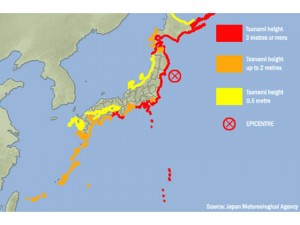
27 March 2011
Operators of troubled Japan nuclear plant say huge spike in radiation levels was a mistake
Ship Rejected in China Port on ‘Abnormal’ Radiation Heading Back to Japan
Tsunami Uncovers Nuclear Reactor's Thirst and Highlights Need for WhisprWave Boat Barriers
Signs of disaster were there to see
Japanese Rules for Nuclear Plants Relied on Old Science
Phi Beta Iota: An excellent review, it emphasizes lack of professionalism rather than lack of integrity. The two go together. We are increasingly of the view that collective intelligence needs some form of individual capacity to “ring the bell” and demand group attention to “weak signals.” We hope that this disaster becomes a catalyst for holding all concerned to higher standards of transparency and truth. The information is not lacking–the integrity (holistic thinking) is….and the latter is what will advance renewable energy, energy conservation, and a completely new approach to the design of human habitats.
Climate Change: Trapped in a Time Gap
Level of iodine-131 in seawater off chart: Contamination 1,250 times above maximum limit
Radiation in seawater off nuclear plant spikes to 1,250 times normal (VIDEO)
Japan Reports Higher Radiation Levels In Seawater Near Fukushima Nuclear Plant
Tsunami and radiation may sink Japanese fishermen
Chinese Spin (Xin-hua): Japan's nuclear crisis is mainly public panic, not radiation risk: Australian expert
Australian Spin (Sydney Herald): Uranium watch shows the future is still nuclear
Japanese Spin (Japan Times): Spare us shoganai as we face an ominous spring
Voice of Reason (UK): George Monbiot is wrong. Nuclear power is not the way to fight climate change
In 2008 and 2009 more renewables came onstream in both Europe and America than did all fossil fuels and nuclear combined. In Europe in 2009, wind and solar PV alone provided more than half all new generation.
Graphic: Japan Disaster in Figures 25 March 2011
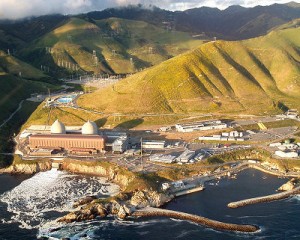
25 Mar Nuclear Costs to Soar Post Japan Disaster
25 Mar Japan nuclear crisis a wake-up call for China
“Before the Japan disaster, most people do not necessarily
understand the risks they are facing”
–Changhua Wu, Greater China director of The Climate Group
25 Mar German Chancellor Calls for Tests of Europe’s Nuclear Reactors
24 Mar Sea Level Rise Brings Added Risks to Coastal Nuclear Plants
24 Mar If We Built a Safer Nuclear Reactor, How Would We Know?
Phi Beta Iota: While we may look back on the Japanese catastrophe as an Awakening moment, the real awakening has not yet occurred. Governments are not structured to do Whole of Government strategy or holistic analytics of the ten threats, twelve policies, and eight demographics, i.e. they lack appreciation for a Strategic Analytic Model and they do not understand that anything less than multinational bottom-up thinking will simply not do. Everyone has lost sight of the fact that how one creates energy is about everything, always, not just about energy. Global intelligence is not yet mature.
24 Mar Japan Case Study in Nuclear Information Ignorance
23 Mar Japan Lost Its Integrity over Nuclear Safety
19 Mar Climate Change, HAARP, Process, Politics, Power
18 Mar Governor Jesse Ventura on HAARP
18 Mar What Is HAARP? 9:51 Japan Video Reality Check
18 March 2011: The original Post
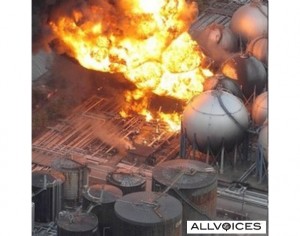 Phi Beta Iota: Below the line is a message with multiple links from Tom Atlee, co-creator of the Co-Intelligence Institute, and one of the seers we most admire.
Phi Beta Iota: Below the line is a message with multiple links from Tom Atlee, co-creator of the Co-Intelligence Institute, and one of the seers we most admire.
1. Japan's enormous suffering, a second Hiroshima in the making, is an opportunity for conscious citizens to do what their political “leaders” have refused to do for so long: put nuclear back in the box.
2. The tsunami is NOT an “Act of God.” It is an act of man, and the book, Acts of God–The Unnatural History of Natural Disaster in America along with the two prescient books by Charles Perrow, Normal Accidents–Living with High-Risk Technologies and The Next Catastrophe–Reducing Our Vulnerabilities to Natural, Industrial, and Terrorist Disasters make this clear. The jury is still out, but there are legitimate concerns that this was caused by High Frequency Active Auroral Research Program (HAARP).
3. The time has come for a top to bottom international inspection of High Frequency Active Auroral Research Program (HAARP) and the broader electromagnetic programs of the major governments. Changes to the Earth that used to take 10,000 years now take three. We believe that a partial cause of global climate instability can be found in the massive electromagnetic influences of an Industrial Age that does not understand and that governments have refused to study in depth and in coordination with one another.
On this point see also Governor Jesse Ventura on HAARP and What Is HAARP? 9:51 Japan Video Reality Check.
4. Water is the new nuclear. What is being done to water by government permission, corporate abandon, and public inattention is going to be a greater challenge than energy (with the good news being that infinite free energy, once achieved, makes the water issue go away). It is simply irresponsible to not have a Strategic Analytic Model and a global focus on voluntarily eradicating all ten high level threats to humanity by documenting and disseminating “true cost” information on all products and services (the over-all toxicity of everything else is WORSE than nuclear alone), and harmonizing public spending across the twelve core policies.
5. Haiti is still out there. Also the Congo, 175 failed states, 44 dictators, and a global financial system so lacking in ethics that economies have been collapsed and “no one goes to jail.” Haiti and Japan are an opportunity. What we have been doing is not only not working for 95% of humanity, it is creating consequences we do not understand and cannot anticipate.
From Tom Atlee

Dear friends,
Probably virtually everyone on this list is aware of the triple crises in Japan — mega-earthquake, mega-tsunami, and mega-nuclear catastrophe. I have found it often difficult to find truly useful information and perspectives on this crisis, especially the nuclear one where the combination of breakdowns in both reactors and spent fuel rod pools has potentially global implications.
Below are some good sources of ongoing information and three articles I found particularly useful in thinking about the larger picture around this. I hope they are useful for you.
Coheartedly,
Tom
ONGOING UPDATES AND TECHNICAL ASSESSMENTS
Department of Nuclear Science and Engineering at MIT
Nuclear Information Resource Service
Wikipedia: Fukushima I Nuclear Accidents article
Continuous news feed in English from NHK
THREE CLARIFYING ARTICLES – ESPECIALLY ON FUEL ROD POOLS
“This Could Become Chernobyl on Steroids”: Nuclear Engineer Arnie Gundersen on Japan’s Growing Nuclear Crisis
DemocracyNow! Tuesday, March 15, 2011
The Japan Nuke Problem No One's Talking About by Sharon Begley
When Spent Fuel Rods Ignite – Pools of Nuclear Fire March 16, 2011 By JEFFREY ST. CLAIR
Reference: 10 High-Level Threats to Humanity
Worth a Look: Book Reviews on Environmental Degradation (Other than Emissions)
Graphics
Holistic Analytics for Nuclear-Climate
Graphic: Nuclear Plants & Seismic Zones (Global)
Graphic: Nuclear Plants & Seismic Zones (USA)
Graphic: Nuclear Risk to Populations (USA)
Graphic: Fukushima Radioactive Debris (Across An Area Larger than Central Park in NYC)
Graphic: Earthquake Basics, Nuclear Insanity



